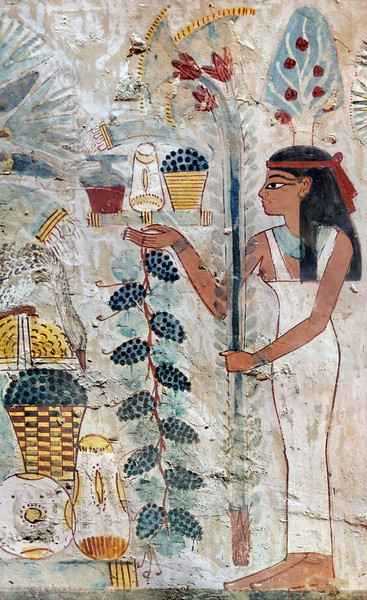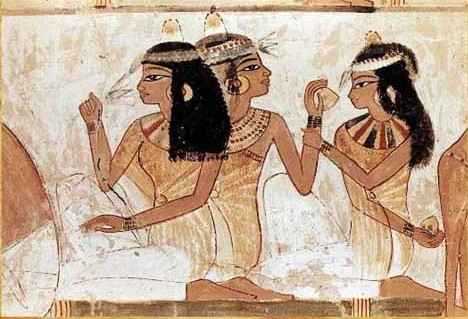The warm scent of sandalwood has filled this room and is working its way out through the rest of my house, dispersed from essential I have warming on an electric incense burner. After working in the yard for a while, amidst the tang of cut grass and a brewing summer storm, I walk back into a dreamy sandalwood sanctuary. The very smell turns my thoughts to the sacredness of life, the peacefulness of meditation.
 Our ancient Egyptian friends put a great deal of their effort and money into perfumed oils and incenses. In the temple, the image of a god was wakened, washed, dressed and anointed with fragrant oil or ointment each morning. Ointments and oils were regular offering items, scented with selections from the profusion of flowers and plants that grew along the Nile, or valuable imports like frankincense and sandalwood.
Our ancient Egyptian friends put a great deal of their effort and money into perfumed oils and incenses. In the temple, the image of a god was wakened, washed, dressed and anointed with fragrant oil or ointment each morning. Ointments and oils were regular offering items, scented with selections from the profusion of flowers and plants that grew along the Nile, or valuable imports like frankincense and sandalwood.
And speaking of flowers, it was customary to greet guests for dinner at your house by placing around their neck a garland of fresh flowers. A touching element of undisturbed tombs found in modern times is the now-dried fresh flowers which were the last thing left on the casket, much like our custom today at a cemetery burial ceremony.
Cinnamon, cassia, myrtle, balsam, myrrh, honey, sweet flag, juniper, sage, cypress, iris, rose and, of course, lotus were all ingredients prized for their scent. Still more natural ingredients were used medicinally, including acacia, camomile, basil, dill, celery, cumin, fenugreek, lily, mandrake, pine and rue. Servants circulated at dinner parties with cones of goosefat mixed with perfume for guests to put on their heads. During the course of the evening the fat melted down through those heavy wigs, releasing the scent into the banquet hall.

The psychological effects of association with a particular smell are by now well known. Take advantage of that powerful tool by using your favorite scent whenever you meditate or do other work at your altar. True essential oils are a nice break from the smoke of burned incense, particularly if you are allergy-prone or have a respiratory illness like asthma. Just a drop in a much larger quantity of almond oil will allow you to breathe in the benefits of that plant.
And if you really want to treat yourself, Sacred Luxuries: Fragrance, Aromatherapy & Cosmetics in Ancient Egypt, by Lise Manniche, is a deliciously aromatic read, plus a gorgeous coffee-table book.






 Our ancient Egyptian friends put a great deal of their effort and money into perfumed oils and incenses. In the temple, the image of a god was wakened, washed, dressed and anointed with fragrant oil or ointment each morning. Ointments and oils were regular offering items, scented with selections from the profusion of flowers and plants that grew along the Nile, or valuable imports like frankincense and sandalwood.
Our ancient Egyptian friends put a great deal of their effort and money into perfumed oils and incenses. In the temple, the image of a god was wakened, washed, dressed and anointed with fragrant oil or ointment each morning. Ointments and oils were regular offering items, scented with selections from the profusion of flowers and plants that grew along the Nile, or valuable imports like frankincense and sandalwood. 











